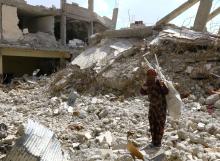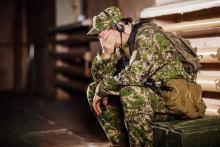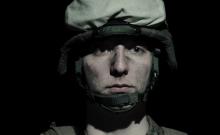post-traumatic stress disorder

But while my ethical objections led me to atheism, my trauma led me back to Christ. Simply put: I had a relapse and sought out a faith community because I needed to be around people. Praying helped. Being around people helped. Devoting myself to something bigger than myself and to Christ on the cross was an incredible comfort while I searched for effective medical treatment.

Our findings are alarming: 1-in-3 men and women screen positive for PTSD (similar to the lifetime prevalence in Vietnam War veterans), nearly half show a high level of depression, and half exhibit high anxiety. Half of children show high anxiety. Nearly 80 percent separation anxiety in children restricts their ability to go to school and explore their new world. The number one concern expressed by teachers is their difficulty attending school because of high separation anxiety. This is especially critical because cumulative research shows serious negative effects of untreated childhood trauma on mental and physical health in adulthood.

If we remember the morally injured on this Memorial Day, then perhaps we should also take a moment to critically examine the values that shape our collective ideas about goodness.

National Minority Mental Health Awareness month is upon us in the U.S., and never has the scope and impact of mental health issues threatened to affect the long-term security of our country and world than now.
This year, the UN Office for the Coordination of Humanitarian Affairs estimates that 10.8 million people are affected by the conflict in Syria, with 4 million refugees having fled the country. This is the largest refugee population coming out of any one conflict in over a generation. Similarly, in early 2015, UNHCR estimated that the total population of concern, due to the conflict in Iraq, exceeded 3 million people. Millions of people have experienced the unimaginable trauma of political and religious conflict and persecution in the Middle East, especially women, whom the Iraqi Ministry of Health determined were disproportionately affected by mental health illness due to the recent conflict. The scale and depth of the trauma demands a multi-faith, multi-sector, multi-discipline response, before it is too late.

My Uncle Norman fought in Europe during World War II. An artillery observer, he didn’t return with many “heroic” stories to tell. When I was little, he would roll out some souvenirs from the war, and I’d be impressed: German military dress knives and lovely table linens. I don’t recall all of the stories or how these things became his, but I’m pleased to report the table linens were a gift. His war experience was hardly glamorous.
Uncle Norman did tell of one harrowing experience. He and his partner were identified by German artillery, and they experienced exactly the treatment they dished out. Out in front of their own unit, as they always were, they heard a shot go just overhead and explode behind them. Then one fell just short. Placing a shell a bit to the left and one to the right, the Germans had them zeroed in. Uncle Norman’s friend panicked, frozen, stuck to the ground. And in the last minute – as he remembered it – my uncle tackled his partner and carried him to safety. Pretty dramatic stuff for a kid to hear.
When Uncle Norman was much older, he came close to death after gall bladder surgery. That night he experienced profound nightmares, the Lady Macbeth experience of bloody hands he could not cleanse. The next day, he told me a very different story than the ones I’d heard before. I believe I was the first to hear of the time when he called in the coordinates for an intersection across which a significant body of Germans was crossing. For 30 minutes, he said, he watched the effects of the barrage he had targeted. And now, 40 years later, his hands wouldn’t come clean.